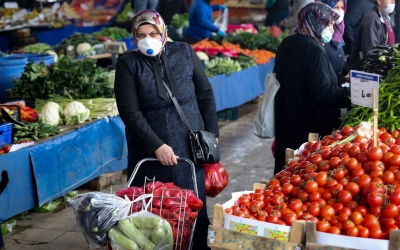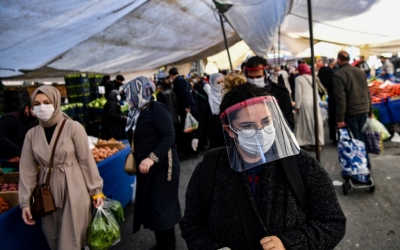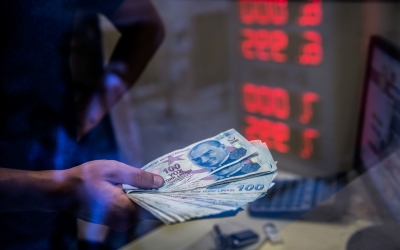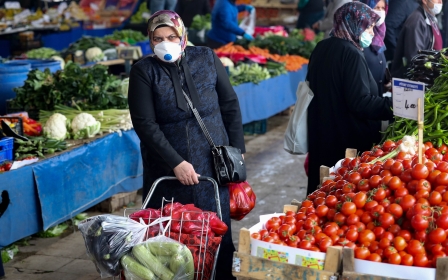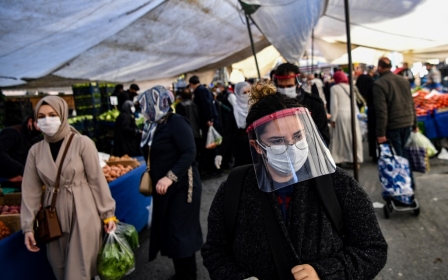Turkey lira slump: Fears new regulations will stifle criticism of economic policy
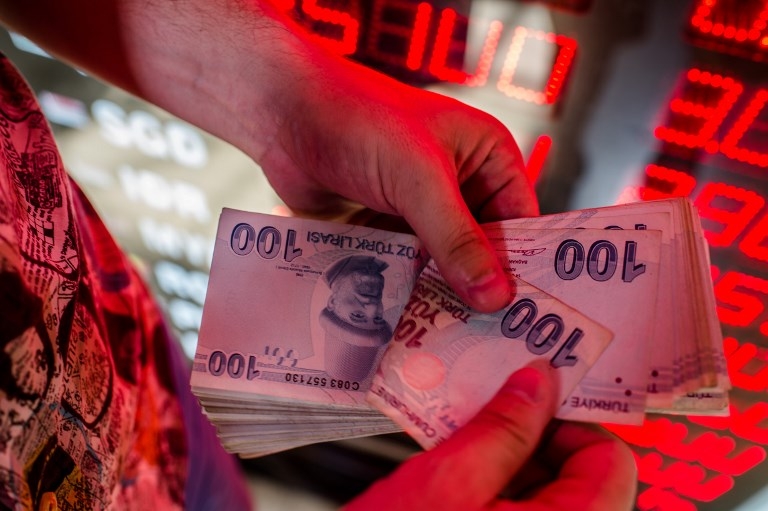
Sitting on his computer at home last week and working with his colleagues via Zoom in a meeting about the next day's economy page, columnist Ahmet Yilmaz* received a message on his newspaper’s WhatsApp group.
The publication's chief editor was contacting staff to warn them that from now on they should be more careful about what they write.
The editor was referring to a new regulation published in Turkey's Official Gazette entitled, “Regulation on Manipulation and Misleading Activities in Financial Markets”.
Critics say that although the new law is officially aimed at those working in banking and finance, the wording of the regulation is so broad that authorities could punish any comment on the economy by any source.
Article 4d of the regulation reads that it would be considered an offence: “To publish false or misleading information or rumours that would or could lead to an abnormal or artificial price or that creates or may create a false or misleading impression relating to prices of any financial instruments, including demand or foreign exchange rates on any means of mass communication, including the internet or any other way.”
The new regulation published in the gazette on 7 May takes effect immediately.
“They can accuse you with manipulation easily. We have seen this in the past even before this regulation," Yilmaz told Middle East Eye.
"Dozens of people, even ordinary citizens, have been detained and their cases are ongoing.
"Everyone from journalists to social media users are already self-censoring.”
A study by the Turkish Journalists' Union published this month suggested that as many as 79 percent of journalists working in the country are self-censoring.
'They want to scare journalists'
At the beginning of 2020, Turkey's economy appeared to be on the path to recovery after a deep two-year recession.
However, with the advent of the coronavirus pandemic, the government is now struggling to explain a second downturn and currency crisis in as many years.
'The dollar didn’t rise naturally in these corona days, it is a result of these international financial institutions, these gangs that are under the control of a ‘mastermind’'
- Mehmet Metiner, former adviser to Turkey president
The economic weakness has again prompted speculators to take aim at the Turkish lira, which last week hit a historic low against the US dollar.
Although it has since recovered a little, it is still 15 percent lower than at the beginning of 2020.
Yilmaz told MEE that the government tries to scare journalists so they will not report on the downward trends in the economy.
He referenced the recent jailing of Baris Terkoglu and Baris Pehlivan for exposing new religious cults replacing the Gulenists (who were accused of an attempted coup in 2016) in the state, and Murat Agirel for writing about graft and corruption.
"Now, they want to scare journalists to hide the economic crisis."
'Gangs under the control of a mastermind'
Mehmet Metiner, a former adviser to Turkey President Recep Tayyip Erdogan and three-term MP, defended the new regulation, pointing to “forces that aim to destroy the Turkish economy who are directed by a ‘mastermind’.”
“They conducted heavy attacks on the economy," the pro-government Sabah newspaper columnist told MEE.
"The dollar didn’t rise naturally in these corona days, it is a result of these international financial institutions, these gangs that are under the control of a ‘mastermind’.”
Erdogan made similar remarks on Wednesday, saying that Turkey will "frustrate those who think they can use overseas financial institutions to bring down our economy”.
Other officials from Erdogan's ruling AK Party have also said the fall of the lira and the problems the economy is facing are not necessarily a failure of their policies but of an international plot.
Metiner compares the situation to the Gezi Park protests of 2013 when a wave of demonstrations and civil unrest took place in Turkey, and the attempted coup of 2016.
“They want to take advance of the pandemic and try to come to power by doing so," said Metiner.
"This is the plot. This is another version of the 15 July coup attempt. It is a continuation of Gezi.”
'London-based economic attacks'
London, as a global financial centre, has become a focal point of the origin of the conspiracy against the Turkish economy argued by its proponents.
“This project is carried out by domestic and external apparatus controlled by the ‘mastermind'," said Metiner.
"Therefore, London-based economic attacks, with the help of domestic instruments, try to influence the public and politics to obtain power.
“They try to divide Turkey from within. They want a smaller Turkey. A Turkey whose economy is destroyed.
"A Turkey without strong leadership. A Turkey without political stability with internal conflicts.
"A Turkey that deals only with its domestic problems. A Turkey that submits to them. A Turkey that is under the command of the imperialist ‘mastermind’."
"This is what they want... They want to get rid of Erdogan’s leadership because he is resisting this plan,” said Metiner.
'Mismanagement of the economy'
Aykut Erdogdu, deputy chairman of the main opposition CHP and an Istanbul MP, agrees that if there are manipulators, they should be punished; but he argues that is not the real problem.
“What the country is experiencing is a result of the mismanagement of the economy. If there are attacks on the economy, it is a result of this mismanagement,” the former treasury inspector told MEE.
“Government officials blame financial institutions in the UK. The UK is the financial centre in the world, in Europe.
"Even these statements show the shortcomings of their foreign and economic policy.
"Those institutions are good when you borrow money from them; when you borrowed $440bn - a record amount in the history of the country - but when you have to pay it back, you talk about an attack after you made this economy so vulnerable.
"This will only discredit you [in the eyes of the financial markets] and will lead to higher interest rates when you want to borrow.”
'Different courts give different decisions'
Efkan Bolac, a prominent lawyer, told MEE: “Legally, these laws and regulations seem to be bonding only for people in the finance business, but in reality, it is not the case.
"For example, I am defending a young man who has nothing to do with finance. Just because he wrote on social media that the ‘dollar is 7.25 Turkish lira now’, he is being tried in court.
"With 50 others, he is accused of staging an ‘economic coup’.”
Talking about the fear many people and journalists now have about their private exchanges on mediums such as WhatsApp being used as evidence against them, Bolac said: “Different courts give different decisions.
"Some say these fall under privacy while some say the opposite. So in groups with two or more members, it is punishable for many prosecutors.”
Acknowledging the concerns of citizens and journalists over the latest regulation, Bolac said:
“I had a case of a WhatsApp group with 12 members. One member was tried for calling the [2016] coup attempt ‘theatre’.
"The court decided that it was a private conversation. He was jailed for 54 days and released.
"But in the same group, two people received a sentence of 10 months in prison from another court for ‘defaming the president’.
"So there is an inconsistency in court decisions about similar issues. Courts don’t give standard decisions based on law.
"Therefore, I can’t say what kind of results this new regulation will lead to. The general practice is that when the conversation includes more than two individuals, that it is a punishable act.”
Faith in the judiciary
Economist Evren Zelyut, who was detained and recently acquitted over comments on the economy, told MEE that he is aware of the possibility of the new regulation being misused but underlined that he still trusts the Turkish judiciary system.
“I still say what I believe. Yes, I was taken under custody. Yes, I was tried in court, but in the end, I was acquitted,” he said.
Hakan Yazici, a well-known Harvard graduate and banking and capital markets lawyer, said: “Is our economy worse than Greece? Surely not. Is there more rule of law in Russia than us? Surely not.
"I believe investors are more concerned about economic politics in Turkey and that is making the difference in our CDS (Credit Default Swap) rates, a very important indicator of country risk for investors.”
“Last week Citi, BNP and UBS banks were restricted from transacting in Turkish lira," said Yazici.
"This resulted in some banks not closing at the end of the day, for the first time since Turkey's 2001 financial crisis.
"Yesterday, this decision was overturned, this time creating doubts about the consistency of decisions taken.
"On 7 May, the Regulation on Manipulation on Financial Markets was issued, which worried the already concerned foreign investors with its vague language.
"I believe we are, and will be, paying a heavy price for weakening the concepts such as the rule of law, consistency in law, and its application being non-arbitrary.
"And I am afraid not only in terms of a delay in attracting foreign investment, but in many other social aspects,” Yazici said.
'Turkey losing its credibility'
In December, former economy minister Ufuk Soylemez told MEE that “in a democratic country, no one would call a journalist reporting on the economy a terrorist and try to jail them for treason”.
Commenting on the latest developments, he said: “In recent days, it is known [Finance] Minister [Berat] Albayrak held a teleconference meeting with foreign investors.
'You can’t run an economy with these kinds of regulations and restrictions. Even if your goal is not to restrict reporting, just creating this feeling will hurt you'
- Ufuk Soylemez, former economy minister
"He tried to convince them Turkey will not act against free market principles, but a few days later this regulation was published.
"Unofficially, authorities said this wasn’t directed against journalists but there are so many articles that can be misused.
"You can’t run an economy with these kinds of regulations and restrictions. Even if your goal is not to restrict reporting, just creating this feeling will hurt you.
"I don’t believe that this regulation will help to solve the problem, but on the contrary will lead to more unease and fear in the markets.
"If you are a free market economy, you can’t do this. Economic troubles can’t be solved with regulations, capital controls, and fines.
"If you aren’t a state governed by laws and don’t follow economic principles, you will lose your credibility.
"Therefore, to be a state governed by laws is as important as creating regulations like this. In those terms, I am sad to see Turkey losing its credibility.”
*Not their real name
Middle East Eye delivers independent and unrivalled coverage and analysis of the Middle East, North Africa and beyond. To learn more about republishing this content and the associated fees, please fill out this form. More about MEE can be found here.


